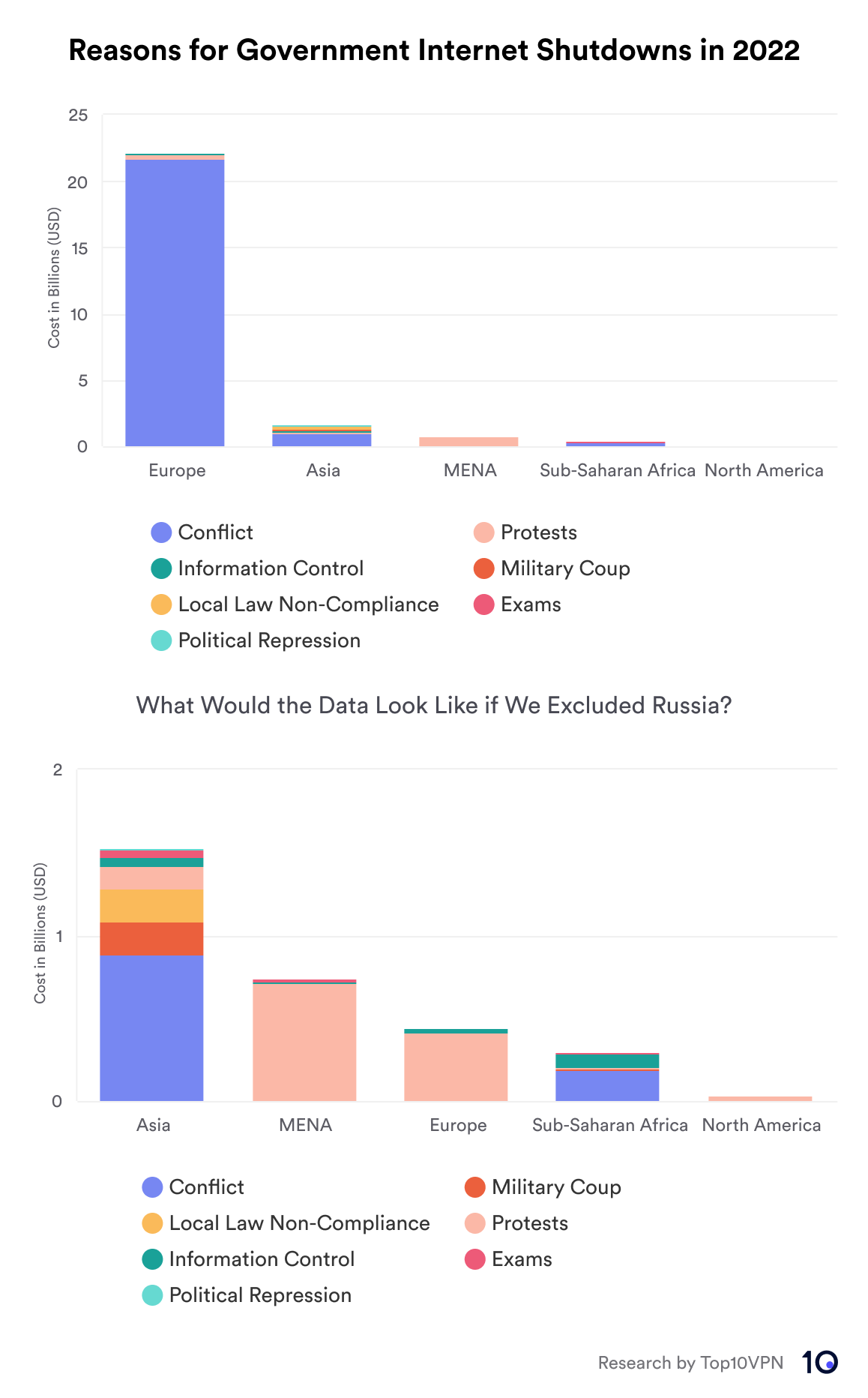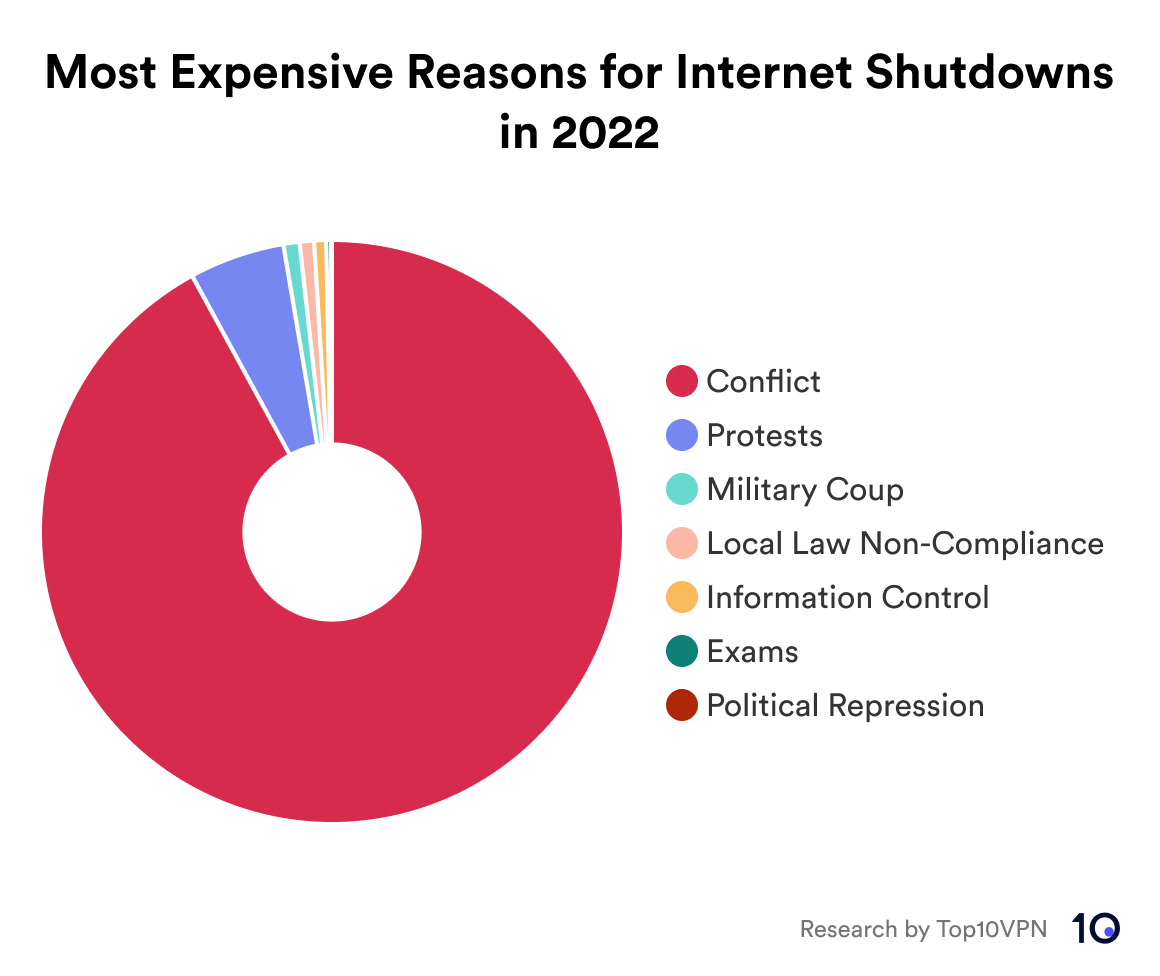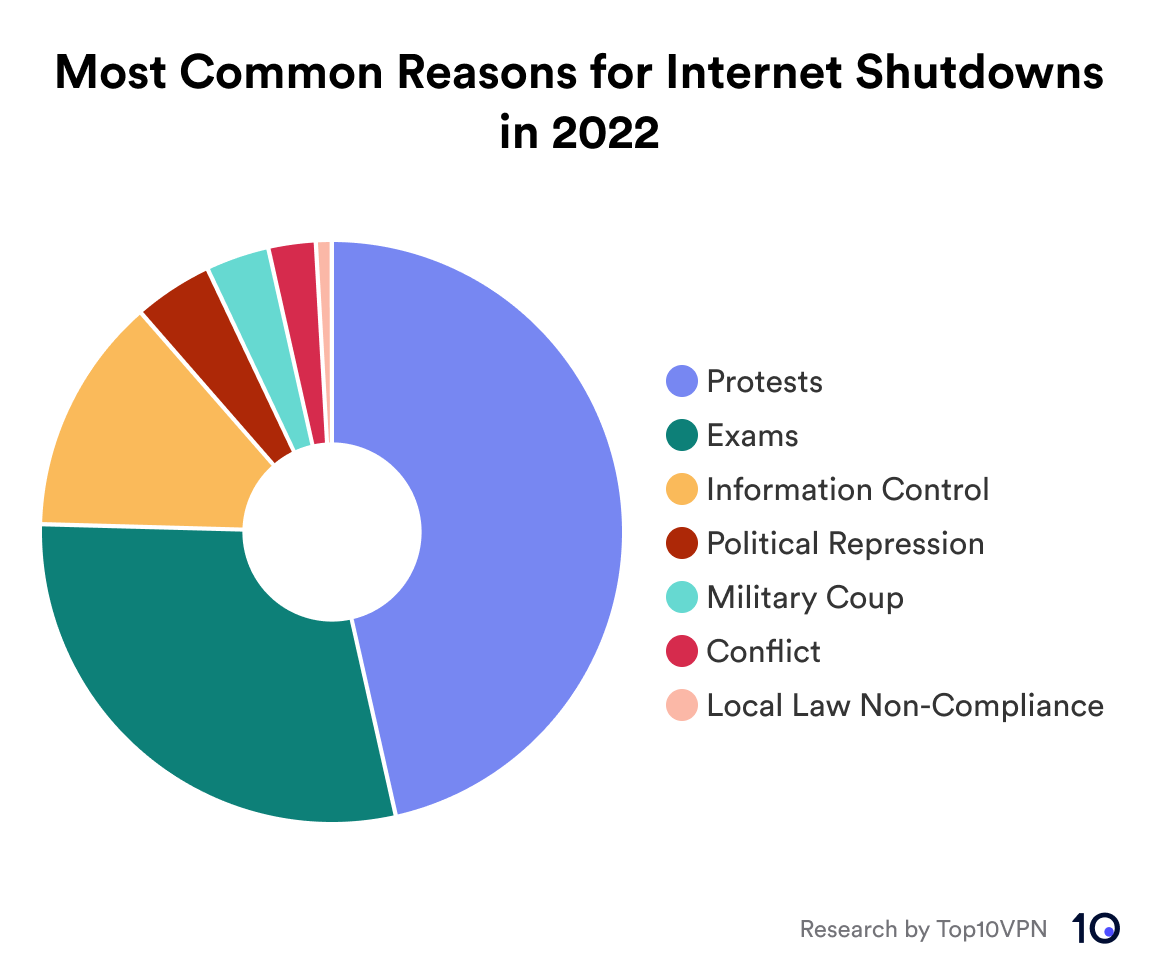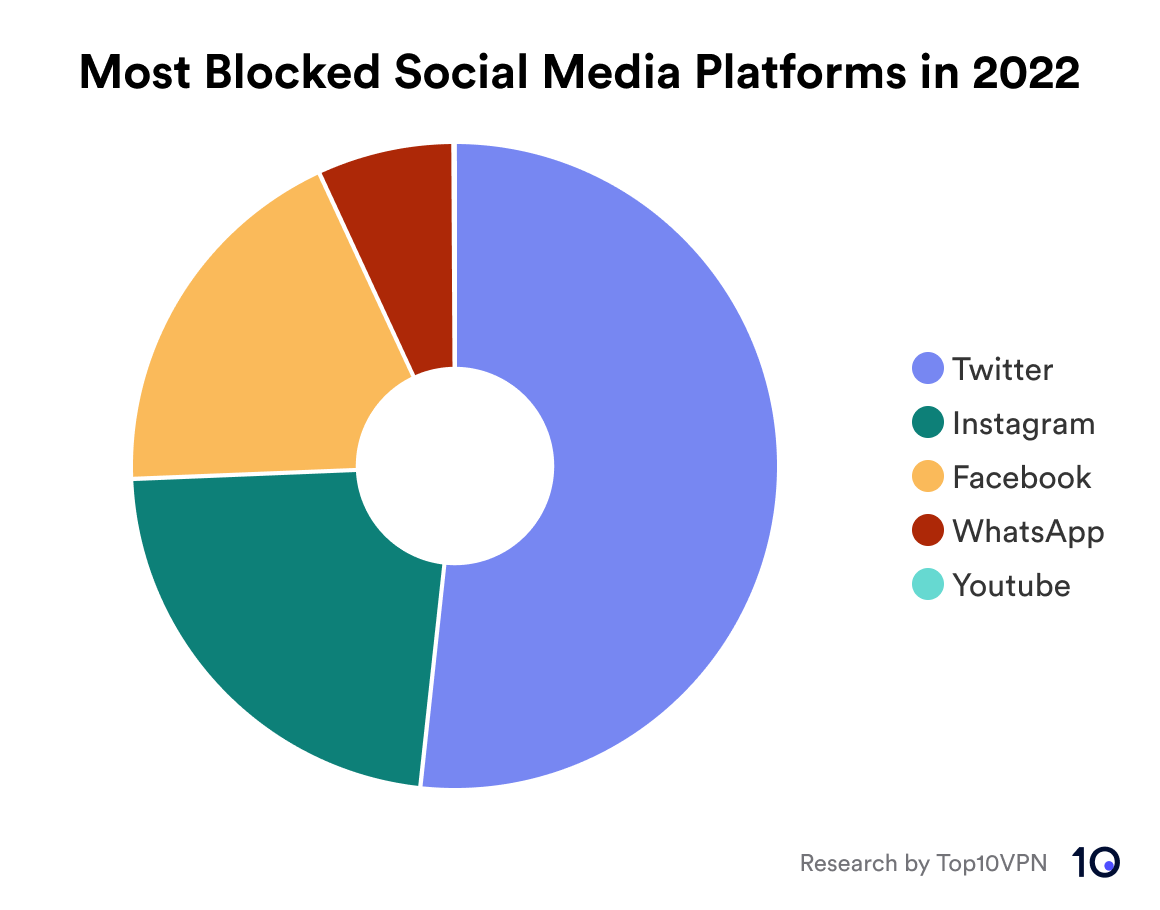Government Internet Shutdowns Cost $24.6 Billion in 2022
Our annual report analyzes every major intentional internet shutdown in 2022 and reveals that they cost a world economy already reeling from a number of shocks a further $24.61 billion.

Internet Shutdowns: Economic Impact 2022
- $24.61 billion: economic cost of internet shutdowns in 2022, up 337% from 2021
- 114 major deliberate internet outages took place in 23 countries
- 50,095 hours of government internet disruptions, a 45% increase vs 2021
- Internet blackouts: 23,097 hours
- Internet throttling: 134 hours
- Social media blocks: 26,865 hours
- 710.8 million people affected by deliberate internet outages in 2022, up 41% year-on-year
- Twitter: the most blocked social media platform, suffering 21,650 hours of deliberate disruption – 56% more than Instagram and 64% more than Facebook.
- Russia: the single most affected nation ($21.59 billion), followed by Myanmar ($1.09 billion) and Iran ($711.8 million).
- Human rights impact: 51% of government internet outages were associated with additional human rights abuses, a 30% decrease compared with 2021:
- 51% of all internet disruptions were also associated with restrictions on freedom of assembly
- 3% with election interference
- 11% with infringements on freedom of the press
What is the Cost of Internet Shutdowns Tracker?
This Global Cost of Internet Shutdowns report calculates the total economic impact of every major deliberate internet outage and social media shutdown around the world in 2022.
This kind of deliberate disruption is internet censorship in its most extreme form. Not only do these internet outages infringe on citizens’ digital rights but they are also acts of national economic self-harm.
The data table below shows the country-by-country breakdown of the global cost of internet shutdowns in 2022.
Government internet outages in 23 countries lasting over 50,000 hours cost the global economy $24.61 billion in 2022, a 337% increase in impact compared to 2021.
From 2020 onwards, our internet shutdowns data also indicates where additional human rights abuses were perpetrated during these disruptions. We have highlighted these abuses in order to illustrate the wider context in which these internet shutdowns take place.
How Do We Calculate The Cost of Internet Shutdowns?
We monitor every national and region-wide internet outage and social media shutdown imposed by governments around the world in order to determine the duration and extent of the restrictions. This allows us to best determine the economic impact of each internet outage using the COST tool.
This tool was developed by internet monitoring NGO Netblocks. It is based on indicators from the World Bank, ITU, Eurostat and US Census.
In our Cost of Internet Shutdowns reports, we include social media shutdowns, internet blackouts and severe ISP throttling in our calculations. These types of disruption to normal internet access are defined as follows:
- Internet blackouts: where internet access is completely cut off by the government. This extreme measure cannot be directly circumvented.
- Social media shutdowns: where access to popular social media, such as Facebook, WhatsApp or Twitter has been blocked. These can typically be circumvented by using a Virtual Private Network (VPN).
- Severe throttling: where speeds have been reduced to 2G, which permits the use of SMS and voice calls only. This is an internet blackout in all but name.
Internet service providers (ISPs) rely on a range of technical measures to implement internet shutdowns, including IP blocking, DNS filtering and BGP manipulation. You can read more about these tactics on our main Cost of Internet Shutdowns live tracker.
Why Are We Tracking The Cost of Internet Shutdowns?
We stand opposed to internet censorship and to governments withholding access to the internet as a form of social control.
Our goal in doing this research is to keep public attention focused on just how damaging internet shutdowns truly are. This damage is both direct, in terms of the economic and human cost, and indirect, in that it forces people to use unsafe VPNs to try to circumvent the restrictions imposed upon them.
If you think an internet shutdown is likely, it’s worth reading up on the best ways to stay online.
See our live tracker of spikes in VPN demand around the world
Internet Shutdowns 2022: Cost by Country
The following data table shows all countries that have experienced a major internet shutdown in 2022. The table is ordered from greatest to least economic impact, measured in USD.
The data table also indicates the nature of any additional human rights abuses perpetrated during each internet shutdown. A cross indicates that the human right specified was violated during the period around the internet outage.
For data on individual internet shutdowns, see the Cost of Internet Shutdowns Tracker Data Sheet.
For more information on the circumstances of each country’s shutdowns, jump to the Internet Shutdowns Background 2022 section of this report.
Internet Shutdowns 2022: Cost by Region
The following data table shows the total economic cost of all major internet shutdowns in 2022 broken down by the global region where the disruptions occurred. The data table is ordered from greatest to least economic impact, measured in USD.
The two bar charts below show the economic impact of all major internet shutdowns in 2022 on each of the global regions where the disruptions occurred, broken down by context, i.e. the reason why authorities disrupted internet access.
The first chart includes data from all regions, with Russia included under Europe. While this chart clearly demonstrates the outsize impact of Russian outages on the world economy in 2022, it doesn’t communicate much that’s meaningful about why shutdowns were implemented elsewhere.
We have therefore created a second graphic with Russia excluded from the data in order to better highlight the reasons for internet outages experienced in other regions and their economic impact.

Bar charts showing the most expensive reasons for internet shutdowns in 2022 across different regions, with and without Russian shutdowns.
Internet Shutdowns 2022: Cost by Context
The following data table shows the total economic cost of all major internet shutdowns in 2022 grouped by context, i.e. the nature of what prompted local authorities to cut internet access. The data table is ordered from greatest to least economic impact, measured in USD.
The data table also indicates the number of incidents in each category and the total duration of deliberate internet outages in hours.
The following chart shows split of the economic cost of all major government internet outages in 2022 by context, i.e. the nature of what prompted local authorities to cut internet access.

Donut chart showing the reasons for internet shutdowns in 2022 with the most economic impact
The following chart shows the split of reasons for all major government internet outages in 2022 by frequency.

Donut chart showing the most common reasons for internet shutdowns in 2022
Internet Shutdowns Background 2022
This section of the report examines the circumstances around each instance of governments cutting or restricting internet access.
We have looked at each country individually and broken out the duration of each type of internet outage. We have also identified the nature of any additional human rights abuses associated with the government internet outages.
Countries are ordered and grouped according to the overall economic impact of their government’s internet restrictions over the course of 2022.
Use the following links to jump straight to the relevant country-by-country section:
- Internet shutdowns costing over $500 million
- Internet shutdowns costing $100-$500 million
- Internet shutdowns costing $10-$100 million
- Internet shutdowns costing $1-$10 million
- Internet shutdowns costing under $1 million
Countries with Internet Shutdown Costs Over $500 Million
Russia
- Social media shutdown: 7,407 hours
- Total cost of internet restrictions: $21.59 billion
- Human rights abuses: Right to peaceful assembly, freedom of press
By far the most severe internet outages in 2022 were in Russia. The Kremlin blocked access to Instagram, Facebook, Twitter in March. While the restriction on access to Facebook and Twitter were initially via internet throttling, the Russian authorities later made the ban official, as part of a wider push to censor websites publishing accurate information about the war. These internet restrictions remained in place at the time of publication.
Demand for VPN services skyrocketed in Russia following the social media ban.
Myanmar
- Internet blackout: 8,760 hours
- Social media shutdown: 8,760 hours
- Total cost of internet restrictions: $1.09 billion
- Human rights abuses: Right to peaceful assembly, election interference, freedom of press
Internet censorship by Myanmar’s continued for a second year following the 2021 coup. Twitter was again frequently blocked in 2022, however the restrictions were more sporadic than the year before and the platform was accessible around half of the time.
While Facebook was no longer blocked in 2022, Myanmar’s ruling junta instead threatened harsh penalties for liking or sharing opposition Facebook posts and comments. [2]
Regional internet blackouts continued in as many as 52 townships, with the Sagaing region most severely affected. Other regions included Chin, Kachin, Kayah, Magway and Mandalay. These punishing blackouts have been ongoing since 2021, often with no more than a few hours respite per day.
The Myanmar government continues to tighten its grip on all aspects of internet communications. It has set a deadline for registering SIM cards on January 31, 2023, at which point all unregistered cards will be deactivated, cutting off millions of people from the internet. Further proposals include the registration of all International Mobile Equipment Identity (IMEI) numbers, which would be linked with the registered SIM card data.[3]
Iran
- Internet blackout: 2,179 hours
- Social media shutdown: 4,863 hours
- Internet throttling: 130 hours
- Total cost of internet restrictions: $711.8 million
- Human rights abuses: Right to peaceful assembly, freedom of press
Authorities in Iran throttled internet access across the entire country for a day in May while targeting individual provinces for hundreds of hours of internet shutdowns and slowdowns throughout May, June and into July. The deliberate internet outages were in response to anti-government protests over the economic crisis gripping the nation.
Iranian authorities again restricted internet access in September, blocking Instagram and WhatsApp indefinitely in response to protests that erupted following the death of Mahsa Amini in custody. Mobile internet access was also frequently cut in rolling curfew-style blackouts.
Demand for VPN services in Iran spiked by over 3,000% in September as Iranians sought to circumvent the restrictions.
Iranian authorities responded by cracking down even harder on VPN traffic and domains, as part of wider blocks on all international internet traffic, while maintaining a domestic internet.
Countries with Internet Shutdown Costs of $100 – $500 Million
Kazakhstan
- Internet blackout: 144 hours
- Total cost of internet restrictions: $410.7 million
- Human rights abuses: Right to peaceful assembly
Internet access was cut in Kazakhstan in response to anti-government protests. After initially disrupting mobile internet access for almost a full day on January 4, Kazakh authorities imposed rolling internet blackouts over a five-day period that lasted for as long as 24 hours at a time.[1]
Uzbekistan
- Internet blackout: 542 hours
- Social media shutdown: 5,088 hours
- Total cost of internet restrictions: $219.7 million
- Human rights abuses: Right to peaceful assembly
The Twitter block in Uzbekistan continued into the new year following the government’s decision to restrict access in July 2021 as a result of new local data laws. Access to the social media platform was not restored until August 2022. Note that we only included the economic impact suffered since January 1 in this year’s report with the cost incurred prior to that included in the 2021 statistics.[4]
Authorities imposed an internet blackout in the Karakalpakstan region in July in an attempt to prevent information about political protests and the resulting crackdown there from circulating more widely.[5]
India
- Internet blackout: 1,451 hours
- Social media shutdown: 82 hours
- Total cost of internet restrictions: $184.3 million
- Human rights abuses: Right to peaceful assembly
India imposed 34 major shutdowns in 2022, significantly more than any other country in the world. As in previous years, shutdowns were highly localized to specific districts, cities and even villages, and tended to be in response to civil unrest, often pre-emptively. For the purposes of this research we only included internet restrictions that applied to larger population zones. Were we to include all Indian internet shutdowns in 2022, no matter the population impact, the total for the year would increase to 75.[6]
The longest single major internet outage in India lasted for a week in June in the Konaseema district of Andrha Pradesh, following protests over proposals to rename the area.
Rajasthan (363 hours) and Jammu & Kashmir (309 hours) endured the most extensive major internet outages overall.
Social media shutdowns are much less common in India than elsewhere in the world, however authorities in the state of Bihar imposed sweeping blocks in June in response to protests over a new military recruitment plan.
Ethiopia
- Internet blackout: 8,760 hours
- Total cost of internet restrictions: $179.9 million
- Human rights abuses: Right to peaceful assembly, freedom of the press
The communications blackout in Ethiopia’s northern region of Tigray continued throughout yet another full year in 2022. There has been an internet blackout in civil war-torn Tigray since late 2020.[7][8]
Countries with Internet Shutdown Costs of $10 – $100 Million
Nigeria
- Social media shutdown: 287 hours
- Total cost of internet restrictions: $82.7 million
The Nigerian government extended the nation-wide Twitter ban, first imposed in June 2021, into January 2022. The ban followed the removal of a tweet by President Muhammadu Bihari by Twitter, as it was in breach of the platform’s rules.
Although the Nigerian government announced plans to restore Twitter access in October 2021, based on the condition that the social media platform would be used for “business and positive engagement”, the ban would not be lifted until the following January.[9] The 222 day-long ban cost the Nigerian economy a total of $1.54 billion over the two calendar years.
Cuba
- Internet blackout: 14 hours
- Total cost of internet restrictions: $30.9 million
Authorities in Cuba cut internet access in Cuba at the end of September after the power outage caused by Hurricane Ian prompted protests. Two internet outages lasted around 7-8 hours each over consecutive nights as Cubans took to the streets to demand the restoration of electricity to their homes.[10]
Turkmenistan
- Internet blackout: 40 hours
- Total cost of internet restrictions: $29 million
Information is scant about the internet blackout in Turkmenistan in April, however it occurred shortly after the inauguration of the country’s new president, amid international criticism of the lack of freedom and fairness of an election that enabled him to succeed his father to the presidency.[11][12]
Turkey
- Social media shutdown: 10 hours
- Total cost of internet restrictions: $19.2 million
Authorities temporarily blocked access to Twitter, Instagram, YouTube and Facebook following a bombing in Taksim, Istanbul on November 13. The blocks were a part of a broader media ban imposed by Turkey’s Radio and Television Supreme Council (RTUK).[13]
We recorded a 771% increase in demand for VPN services compared to the daily average over the previous 30 days. Access to the blocked social media platforms was restored after around 10 hours.
Sudan
- Internet blackout: 74 hours
- Total cost of internet restrictions: $17.8 million
- Human rights abuses: Right to peaceful assembly
Authorities in Sudan continue to use internet shutdowns as part of a harsh crackdown on pro-democracy protests since the military coup last October. Internet access was cut twice in early January and again in June.[14][15]
Internet access in Sudan was also deliberately disrupted by the government 11 times in June to prevent cheating in exams.
Burkina Faso
- Internet blackout: 50 hours
- Social media shutdown: 330 hours
- Total cost of internet restrictions: $12.6 million
- Human rights abuses: Right to peaceful assembly
The Burkina Faso government shut down the internet first on January 10 amid rumors of a failed military coup. While internet access was restored after 15 hours, access to Facebook and WhatsApp on the popular Orange mobile ISP remained blocked for two weeks.[16]
A second internet blackout was imposed on January 23 that lasted 35 hours, as the army announced it had taken complete control of the country.[17]
Syria
- Internet blackout: 45 hours
- Total cost of internet restrictions: $12.6 million
The Syrian government imposed a series of internet outages during high school exams, claiming it was necessary to prevent cheating. At the end of May and in the first weeks in June, there were four internet blackouts of over eight hours each, while in August, a further four internet outages lasted between two and three-and-a-half hours.[18]
Countries with Internet Shutdown Costs of $1 – $10 Million
Algeria
- Internet blackout: 4 hours
- Social media shutdown: 20 hours
- Total cost of internet restrictions: $8 million
While the Algerian government previously imposed full internet shutdowns during exam seasons of years past, disruptions in 2022 were largely limited to restrictions on Facebook access during individual exams.[19]
There was however one internet outage documented on June 13, although this was not a full blackout.[20]
Sri Lanka
- Social media shutdown: 16 hours
- Total cost of internet restrictions: $3.4 million
- Human rights abuses: Right to peaceful assembly
The Sri Lanka government blocked access to Facebook, Twitter, WhatsApp and YouTube, along with VOIP/messaging app Viber, for 16 hours in April in response to peaceful protests over the severe economic crisis affecting the country.[21]
Afghanistan
- Internet blackout: 48 hours
- Total cost of internet restrictions: $2.5 million
- Human rights abuses: Right to peaceful assembly
Afghan authorities cut mobile internet access for 48 hours in August in Kabul for fear of extremists disrupting celebrations of the Muslim holy day of Ashoura.[22][23]
Haiti
- Internet blackout: 21 hours
- Total cost of internet restrictions: $2.3 million
Haiti authorities imposed an internet blackout for nearly a full day in September as protests broke out over fuel shortages and soaring prices.[24]
Tajikstan
- Internet blackout: 936 hours
- Total cost of internet restrictions: $2.1 million
- Human rights abuses: Right to peaceful assembly
The Tajikstan government cut internet access in the Gorno-Badakhshan Autonomous Region (GBAO) in May alongside the launch of an “anti-terrorist operation”. Internet access was eventually restored over a month later without any official announcement regarding the preceding blackout.[25]
Zimbabwe
- Internet blackout: 8 hours
- Internet throttling: 4 hours
- Total cost of internet restrictions: $1.6 million
- Human rights abuses: Right to peaceful assembly, election interference
In two incidents during the weeks leading up to important parliamentary by-elections, authorities in Zimbabwe throttled internet speeds and cut internet access during opposition party rallies.
Disruptions occurred at the internet backbone which serves each provider rather than at the cell towers, according to Netblocks, indicating a deliberate outage rather than simply congestion.[26]
Countries with Internet Shutdown Costs of Under $1 Million
In Pakistan, authorities imposed an internet outage in Lahore and Karachi as they moved to stop a march on the capital on May 25 by supporters of ex-Prime Minister Imran Khan.[27] In two incidents in late August and early September, Pakistani authorities blocked access to YouTube as Khan attempted to live stream speeches.[28]
In Sierra Leone, authorities cut internet access across the nation for a total of nine hours over two days in August as protests took place as a result of a severe cost-of-living crisis.
Meanwhile in Somaliland, authorities imposed a 10-hour internet blackout in August as demonstrators objected to the postponement of presidential elections.
Internet Shutdowns Research Methodology
We review every documented government internet outage and social media shutdown globally in a given year.
We include deliberate national internet shutdowns along with regional disruptions that are on a sufficient scale to be economically significant.
The nature, duration and severity of each internet outage are sourced from Netblocks real-time graphic data and reports, IODA and the SFLC.IN Internet Shutdown Tracker.
The economic cost of each internet shutdown is calculated using the Netblocks Cost of Shutdown Tool, which is based on the Brookings Institution method, with CIPESA’s specialized model used for sub-Saharan Africa. Regional shutdown costs are derived from the region’s economic output as a proportion of national GDP.
Partial internet outages are calculated as a proportion of the above costs based on the most up-to-date internet market-share information publicly available for the affected country.
Internet user data is sourced from the World Bank and government reports. For social media shutdowns, the total number of internet users in the affected location is cited rather than the number of local users of a specific platform. This is because such internet outages affects all internet users’ ability to access social media regardless of their active use of a particular platform.
The authors of all our investigations abide by the journalists’ code of conduct.
References
[3] https://www.theguardian.com/world/2022/jan/07/kazakhstan-protests-thousands-detained-as-president-says-order-mostly-restored ↩
[1] https://www.context.news/surveillance/opinion/myanmar-election-will-seal-militarys-digital-domination ↩
[2] https://www.reuters.com/world/asia-pacific/myanmar-military-threatens-jail-online-likes-opponents-2022-09-20/ ↩
[4] https://thediplomat.com/2022/08/uzbekistan-unblocks-twitter-tiktok-still-restricted/ ↩
[5] https://eurasianet.org/uzbekistan-unrest-stricken-region-plunged-into-information-blackout ↩
[6] https://internetshutdowns.in/ ↩
[7] https://www.accessnow.org/two-years-internet-shutdowns-tigray/ ↩
[8] https://www.hrw.org/report/2022/04/06/we-will-erase-you-land/crimes-against-humanity-and-ethnic-cleansing-ethiopias ↩
[9] https://www.bloomberg.com/news/articles/2021-10-01/nigerian-president-announces-conditional-lifting-of-twitter-ban?sref=mS7JmAUL ↩
[10] https://www.npr.org/2022/09/30/1126189710/cuba-hurricane-ian-blackout-power-protests ↩
[11] https://www.accessnow.org/turkmenistan-digitally-disconnects-nation/ ↩
[12] https://www.iphronline.org/turkmenistan-continued-repression-under-new-president.html ↩
[13] https://netblocks.org/reports/social-media-restricted-in-turkey-after-blast-in-taksim-istanbul-7yNnr0yq ↩
[14] https://www.theguardian.com/world/2022/jan/02/sudans-prime-minister-resigns-as-pro-democracy-protests-violently-repressed ↩
[15] https://www.dw.com/en/sudan-at-least-7-dead-in-mass-protests-against-army-rule/a-62314358 ↩
[16] https://www.voanews.com/a/analysts-burkina-faso-likely-averted-coup-linked-to-military-infighting/6395588.html ↩
[17] https://edition.cnn.com/2022/01/24/africa/military-detains-president-kabore-intl/index.html ↩
[18] https://web.archive.org/web/20221216122352/http://moed.gov.sy/moefiles/docs-2022/pdf/ex-2-2022.pdf ↩
[19] https://smex.org/the-cost-of-internet-shutdowns/ ↩
[20] https://twitter.com/CloudflareRadar/status/1536323864262737920 ↩
[21] https://www.reuters.com/world/asia-pacific/social-media-platforms-blocked-sri-lanka-2022-04-03/ ↩
[22] https://pakobserver.net/telecom-services-in-kabul-shut-down-for-security-during-ashura-atra/ ↩
[23] https://foreignpolicy.com/2022/08/08/taliban-ashura-hazara-afghanistan/ ↩
[24] https://www.nytimes.com/2022/09/16/world/americas/haiti-protests-fuel-price.html ↩
[25] https://rus.ozodi.org/a/31915028.html ↩
[26] https://netblocks.org/reports/internet-slowdown-limits-coverage-of-zimbabwe-opposition-rally-oy9Ykoy3 ↩
[27] https://www.aljazeera.com/news/2022/5/25/clashes-in-pakistan-as-ex-pm-imran-khan-begins-march-to-capital ↩
[28] https://netblocks.org/reports/youtube-disrupted-in-pakistan-as-former-pm-khan-streams-speech-XADMq6Bg ↩
